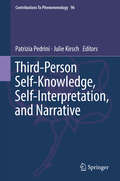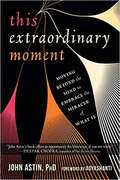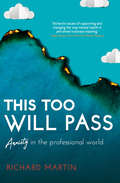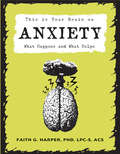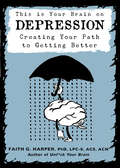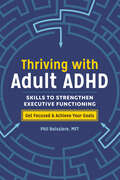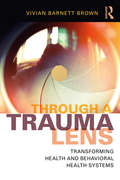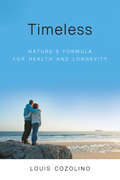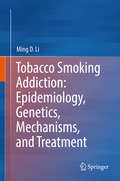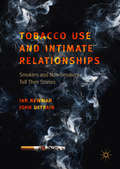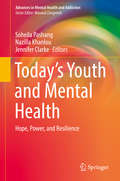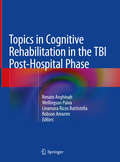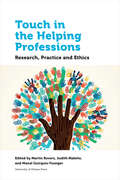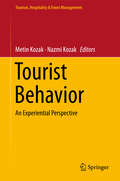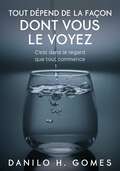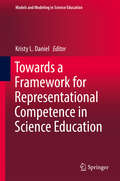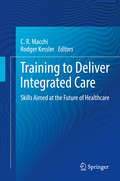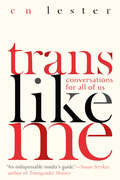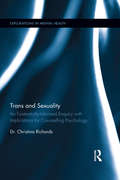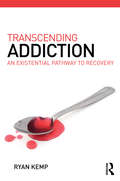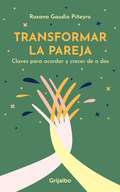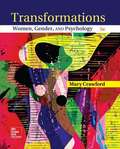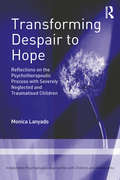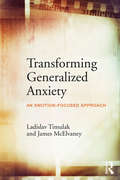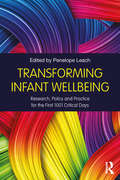- Table View
- List View
Third-Person Self-Knowledge, Self-Interpretation, and Narrative (Contributions To Phenomenology #96)
by Patrizia Pedrini Julie KirschThis volume answers questions that lead to a clearer picture of third-person self- knowledge, the self-interpretation it embeds, and its narrative structure. Bringing together current research on third-person self-knowledge and self-interpretation, the book focuses on third-person self-knowledge, and the role that narrative and interpretation play in acquiring it. It regards the third-personal epistemic approach to oneself as a problem worthy of investigation in its own right, and makes clear the relation between third-person self-knowledge, self-interpretation, and narrative capacities. In recent years, the idea that each person is in a privileged position to acquire knowledge about her own mental states has come under attack. A growing body of empirical research has cast doubt upon the existence of what philosophers call ‘first person self-knowledge’, i.e., knowledge about our mental states that is often thought to be immediate, transparent, and authoritative. This line of thought has led some philosophers to claim that what seems to be ‘first-person self-knowledge’ is really just ‘third-person self-knowledge,’ i.e., knowledge about our mental states that is inferential, opaque, and fallible. This book discusses challenges for first-person knowledge and explores the true nature of third-person knowledge.
This Extraordinary Moment: Moving Beyond the Mind to Embrace the Miracle of What Is
by John Astin AdyashantiAnyone who attempts to describe what is ultimately indescribable faces the same challenge—how does one use words to explain something that transcends language? Many writers fall into the trap of using more words to do the job that most words aren’t even particularly suited for, the ideas growing ever more allusive and abstract as the verbiage piles up. But in trying to unmoor the essence of lived experience from the concepts and stories we use to construct it, author and spiritual teacher John Astin takes a different approach—using fewer words instead of more, and grounding them with exercises designed to evoke the actual experience of what he’s describing. <p><p> Evoking the true nature of experience in words is a tricky proposition: perceptual reality has no beginning and no end, making it impossible to delineate, and what arises internally as thoughts and feelings are equally limitless, indeterminate, and unresolvable. While we have countless ways to categorize, conceptualize, and label things, the truth of whatever is being felt, seen, tasted, touched, or heard is infinitely more complex and multidimensional than our conceptual or linguistic structures would have us believe. By becoming more intimate with experience itself—rather than trying to narrate, avoid, or escape it—we can begin to discover that our experiences cannot possibly limit us in the ways we’ve imagined, owing to their radically open-ended and ultimately indefinable nature. <p><p> This Extraordinary Moment invites you on a journey of boundless inquiry, which becomes a liberating free-fall into the mysteries that lie just beyond our understanding of lived reality—which words can never quite describe. Built entirely around personal experience and exploration, this book provides activities, dialogues, exercises, and meditations to help you unlearn the basic misapprehensions about the nature of moment-to-moment experience, and shows you how to gain distance from the stories you tell about what you’re experiencing, so as to better focus on what’s actually happening in the present moment. <p><p> With ultrashort chapters grounded in experiential practices, and without the use of the usual spiritual jargon, this fast-moving, highly readable book makes the esoteric accessible to all—from anyone interested in stress management, well-being, or positive psychology to the devoted spiritual seeker.
This Too Will Pass: Anxiety in a Professional World (Inspirational Series)
by Richard MartinWhat happens when your world falls apart? How do you start again?By all markers, Richard’s life was a success: he was happily married, a great father, and lived a fulfilling life, professionally and personally. But the pressures of a highflying legal career, his increasing social commitments, and family illness all took their toll.Richard pulls no punches in describing his breakdown and the crushing social anxiety that left him scared to even answer the front door. As his life crumbled around him, Richard fought hard to get to grips with the mental illness taking over his life.This is his inspirational story …
This is Your Brain on Anxiety: What Happens and What Helps (Five Minute Therapy #2)
by Faith HarperAnxiety .... it's the worst. Choking, stifling, smothering, tingling, panicking, brain cutting out, bad decisions... You're a human being, so you know exactly what's being said here. Dr. Faith lays it all out in her five-minute therapy series: what anxiety IS (did you know that people wrote about it more in the 1800s than now?), what it's good for (that's right, it's actually a necessary response that helps to keep us alive in bad situations), how to know when it's gone overboard, and practical tips on how to deal with anxiety when it gets bad. This book is a lifesaver for panic attacks, breaking out of flight-or-fight-or-freeze responses, and for chronic anxiety. It's also good for folks who aren't burdened by anxiety daily but want to cope better with those tough life situations that affect us all. Read this and breathe!
This is Your Brain on Depression: Creating Your Path to Getting Better (Five Minute Therapy #4)
by Faith HarperPeople who have never been depressed have no idea what it's like. And people who have know all too well how tough depression can be to live with. Dr. Faith explains the brain science behind depression (complete with Zuul references) and talks you through the different options out there for getting better. Because yes there are things you can do to feel good again (including drugs but avoiding spiraling successions of drug cocktails). If you need solid expert advice from someone who can also make you laugh your ass off, this book's for you!
Thriving with Adult ADHD: Skills to Strengthen Executive Functioning
by Phil Boissiere MFTProven strategies for strengthening executive functioning skills and overcoming adult ADHD symptomsExecutive functioning skills—including focus, organization, stress management, and more—are critical to succeeding in all aspects of your life. Whether you've just been diagnosed with ADHD or you've lived with it your entire life, you know that developing these skills can be a challenge. Thriving with Adult ADHD offers information, assessments, and evidence-based exercises to help you build a mental skill set and take control of your ADHD.Make real, sustainable changes with practical guidance and activities for sharpening your memory and attention, learning to plan and organize, strengthening your mental flexibility, enhancing your emotional regulation, improving your impulse control, and living your best life.This ADHD book for adults includes:Executive functioning overview—Learn what executive functioning is, how it relates to ADHD, and how these exercises can help you develop it.Solutions for all settings—Discover actionable advice for managing ADHD symptoms at home, at work, and in relationships.Self-assessments—Identify your personal strengths and weaknesses with quick self-evaluations.Don't let ADHD symptoms hold you back. Gain the skills you need to achieve your goals with help from Thriving with Adult ADHD.
Through a Trauma Lens: Transforming Health and Behavioral Health Systems
by Vivian Barnett BrownThrough a Trauma Lens aims to understand and highlight successful examples of health, mental health, substance abuse treatment, and other service delivery systems that have implemented an integrated trauma-informed service model. This innovative volume draws on the author’s first-hand experience working alongside a number of local and state organizations as well as a nationwide survey of notable trauma-informed models. Structured around illustrative case studies, chapters that correspond to stage of adoption, and strategies for cultivating staff support, this valuable new resource include examples and strategies to be applied in any treatment or service setting.
Timeless: Nature's Formula For Health And Longevity
by Louis CozolinoUnlocking the secrets of positive aging. Few prejudices in Western society are more powerful than those concerning aging. Until recently, we have assumed that the story of aging is one of loss and decline. But there’s an entirely different truth. Yes, you can teach an old dog—or even a sort-of-old dog—new tricks. Is there a secret to staying young? It turns out that there are many, and they all begin with nurturing our existing relationships to foster brain health, keeping us happier and healthier. As readers of this book will learn, wisdom, enhanced social relationships, greater adaptation and flexibility (mental, if not physical!)—all these things can be attained as we grow older. Filled with both practical and thought-provoking suggestions, this book is a must-read for anyone who wants to age in style.
Tobacco Smoking Addiction: Epidemiology, Genetics, Mechanisms, and Treatment
by Ming D. LiThis book provides the most recent knowledge on almost all key aspects of the health impact of tobacco smoking. Its 21 chapters focus on both preclinical and clinical studies. The contents are broad, covering the epidemiology of tobacco smoking; genetic epidemiology; identification of susceptibility genomic regions, genes, and pathways as determined by both human and animal studies; evolutionary relations among the different nAChR subunit genes that are so important to the nicotine response; smoking-related diseases; E-cigarettes; and smoking cessation. Furthermore, each chapter includes a detailed and comprehensive list of key references. For both clinical and basic researchers, this book is a valuable resource on nicotine dependence and other addictions.
Tobacco Use and Intimate Relationships: Smokers And Non-smokers Tell Their Stories
by Ian Newman John DeFrainThis book presents a wide variety of insights into the effects of smoking on both smokers and non-smokers. Based on extensive questionnaire surveys from across the USA, this research explores the complex dynamics of intimate relationships and how they are affected by smoking, especially with regard to honest communication. The volume delves into the battles which take place behind closed doors as both smokers and non-smokers invoke personal rights and argue their positions. Finally, the authors explore how health policy and public policy can better serve both smokers and non-smokers, and what the future may hold for the regulation of tobacco use.
Today’s Youth and Mental Health: Hope, Power, And Resilience (Advances in Mental Health and Addiction)
by Nazilla Khanlou Soheila Pashang Jennifer ClarkeThis book focuses on the social and intersectional determinants of mental health among youth. The innovative and cutting edge text arises out of multidisciplinary fields of academic, researchers, policy makers, practitioners, artists, and youth. Contributions from Canada, Germany, Portugal, South Korea, Burkina Faso, Afghanistan, and Jamaica addresses the complexities and the opportunities for youth across contexts. Each chapter entails an introduction to the topic, literature review and research findings, discussion, and implications in regard to research, policy, and practice. A unique aspect of the book is the inclusion of a critical response to each chapter’s content from diverse stakeholders (such as policy makers, front line workers, practitioners, community activists, artists and youth).The book is a critical and current contribution to exploring youth mental health and, specifically, the ways in which youth learn, live, and resist in a world around them. Topics examined include youth social engagement, civic integration, and political participation at multiple local, regional, and transnational levels.
Topics in Cognitive Rehabilitation in the TBI Post-Hospital Phase
by Renato Anghinah Wellingson Paiva Linamara Rizzo Battistella Robson AmorimTraumatic brain injury (TBI) refers to nondegenerative, noncongenital damage to the brain from an external mechanical force, which can lead to permanent or temporary impairment of cognitive, physical, and psychosocial functions, with an associated diminished or altered state of consciousness. Despite this broad definition, it is estimated that more than 1.500.000 people suffer TBI annually in US, with 20% afflicted with moderate or severe forms. Additionally, a high percentage of these patients are unable to return to their daily routine (approximately 50%). In this context, both motor and cognitive rehabilitation are extremely important for these individuals. The aim of cognitive and motor rehabilitation is to recover an individual’s ability to process, interpret and respond to environmental inputs, as well as to create strategies and procedures to compensate for lost functions that are necessary in familial, social, educational and occupational settings. The purpose of this book is to review the basic concepts related to TBI, including mechanisms of injury, acute and post-acute care, severity levels, the most common findings in mild, moderate and severe TBI survivors, and the most frequent cognitive and motor impairments following TBI, as well as to discuss the strategies used to support post-TBI patients. The most important rehabilitation techniques, both from cognitive and motor perspectives, are addressed. Finally, information regarding work and community re-entry and familial and psychological support are discussed in detail.Topics in Cognitive Rehabilitation in the TBI Post-Hospital Phase is intended as a reference guide for all professionals who have contact with or are related to patients suffering from TBI. Any professionals who work with or are related to patients suffering from TBI will find here a broad and comprehensive overview of TBI, addressing all essential issues, from acute care to rehabilitation strategies, follow up and re-socialization.
Touch in the Helping Professions: Research, Practice and Ethics (Health and Society)
by Martin Rovers, Judith Malette and Manal Guirguis-YoungerTouch may well be one of the least understood or talked about subjects in the helping professions. A discussion on the importance and ethics of positive, caring, and appropriate touch in professions such as teaching, nursing and counselling is long overdue. Touch in the Helping Professions delivers just that, weaving together scholarly evidence, research and clinical practice from a wide range of perspectives encompassing philosophy, theology, psychology, and anthropology to challenge assumptions about the role of touch in the helping professions. The contributors to the volume focus not only on the overarching roles of gender, age, culture and life experience, but go beyond to encompass canine-assisted therapy, touch deprivation, sacred objects, as well as key ethical considerations. The prevailing lack of dialogue, due to fear of contravening ethical boundaries, has stood in the way of an open and responsible discussion on the use of touch in therapy. Touch in the Helping Professions is a welcome and much needed contribution to the field—a window onto a fundamental need. This book is published in English. - Cet ouvrage offre un ensemble de données probantes et de résultats cliniques à l’appui du toucher dans le développement physique et émotionnel. Il est structuré selon trois axes : la théorie sur le toucher; la pratique du toucher dans un contexte de thérapie, et les questions éthiques. Il aborde la question du rôle du genre, de l’âge, de la culture et de l’expérience de vie, des sujets comme la zoothérapie, la privation sensorielle, des objets sacrés, et des considérations d’ordre éthique. Les approches variées – philosophie, théologie, psychologie, anthropologie – remettent en question les présuppositions, offrent un contexte historico-culturelprofessionnel, et font appel à des données primaires. Les collaborateurs soutiennent que le toucher sain et non sexuel n’est pas suffisamment enseigné dans le cadre de la formation professionnelle. Cette absence de dialogue – engendrée par la crainte de dépasser des bornes éthiques, fait en sorte qu’une discussion ouverte et responsable sur l’utilisation du toucher dans un cadre thérapeutique ne peut avoir lieu, alors même qu’elle contribuerait aux balises théoriques de notre compréhension de cet enjeu fondamental. Ce livre est publié en anglais.
Tourist Behavior: An International Perspective (Routledge Advances In Tourism Ser.)
by Metin Kozak Nazmi KozakThis book examines and analyzes tourism consumption and tourist experiences, employing a systematic and case study-driven perspective. Covering approaches with a wider geographical background, it considers issues like tourism place experience and co-creation, as well as the behavior of tourists on guided tours, at trade shows and exhibitions, and in museums. Dedicated chapters deal with the aspect of customer satisfaction in places such as hotels or restaurants. In closing, the book highlights tourist behavior in the context of cultural heritage, regional and cultural differences and the general frameworks of consumer happiness and responsibility. Given its focus, the book provides a unique view on the interplay of tourism consumption and tourist experiences, and presents a comprehensive selection of case studies to exemplify and discuss in detail the frameworks covered and the current state of practice.
Tout Dépend de la Façon Dont vous le voyez: C’est dans le regard que tout commence
by Danilo Henrique Gomes Berenice Arrieta CortésDans "Tout dépend de la façon dont vous le voyez", l'auteur propose une vision différente du monde et des problèmes de la vie quotidienne. Basé sur la théologie et la phénoménologie, la fameuse ligne de pensée philosophique, le lecteur peut reprogrammer son esprit pour profiter de la vie de manière simple. Ces dernières années, les vieilles pensées et théories de scientifiques comme William James, Edmund Husserl, Jean-Paul Sartre et d'autres sont analysées, ainsi que la façon dont celles-ci devraient être appliquées dans la vie quotidienne sont exposées dans les pages de cet ouvrage. Votre regard détermine votre mode de vie et cela peut être modifié, par conséquent, plongez-vous dans ce livre et changez votre façon de voir le monde.
Towards a Framework for Representational Competence in Science Education (Models and Modeling in Science Education #11)
by Kristy L. DanielThis book covers the current state of thinking and what it means to have a framework of representational competence and how such theory can be used to shape our understanding of the use of representations in science education, assessment, and instruction. Currently, there is not a consensus in science education regarding representational competence as a unified theoretical framework. There are multiple theories of representational competence in the literature that use differing perspectives on what competence means and entails. Furthermore, dependent largely on the discipline, language discrepancies cause a potential barrier for merging ideas and pushing forward in this area. While a single unified theory may not be a realistic goal, there needs to be strides taken toward working as a unified research community to better investigate and interpret representational competence. An objective of this book is to initiate thinking about a representational competence theoretical framework across science educators, learning scientists, practitioners and scientists. As such, we have divided the chapters into three major themes to help push our thinking forward: presenting current thinking about representational competence in science education, assessing representational competence within learners, and using our understandings to structure instruction.
Training to Deliver Integrated Care: Skills Aimed at the Future of Healthcare
by Rodger Kessler C. R. MacchiThis unique trainer’s resource offers a comprehensive blueprint for preparing clinicians for practice in the changing and challenging environment of integrated care. Based firmly in new evidence-based models of behavioral care in medicine, it sets out the aims and objectives of modern integrated care delivery in a streamlined pedagogy-to-practice framework. Teaching strategies for developing core skills and competencies, suitable across diverse educational and workforce development settings, are presented with data-based rationales and guidelines for design and implementation. Chapters also cover the range of essentials, from research support to business acumen to program evaluation methods, needed to meet bedrock goals of improved quality of care, clinical outcomes, and patient satisfaction. The book’s comprehensive coverage: Reviews the evidence base for integrating medical and behavioral care.Provides empirically sound guidelines for training learners in integrated practice.Breaks down skill development into critical training objectives.Offers detailed content of a current degree program in integrative behavioral medicine.Recommends measures to support responsive, patient-centered, and sustainable training programs. A robust guide to a more inclusive and effective future, Training to Deliver Integrated Care expands the healthcare horizon to accommodate trainers working in health psychology, general practice, primary care medicine, and consulting, as well as supervision and coaching professionals.
Trans Like Me: Conversations for All of Us
by Cn LesterA personal and culture-driven exploration of the most pressing questions facing the transgender community today, from a leading activist, musician, and academicIn Trans Like Me, CN Lester takes readers on a measured, thoughtful, intelligent yet approachable tour through the most important and high-profile narratives around the trans community, turning them inside out and examining where we really are in terms of progress. From the impact of the media's wording in covering trans people and issues, to the way parenting gender variant children is portrayed, Lester brings their charged personal narrative to every topic and expertly lays out the work left to be done. Trans Like Me explores the ways that we are all defined by ideas of gender--whether we live as he, she, or they--and how we can strive for authenticity in a world that forces limiting labels.
Trans and Sexuality: An existentially-informed enquiry with implications for counselling psychology (Explorations in Mental Health)
by Christina RichardsGrounded in cutting-edge qualitative research, Trans and Sexuality explores the sexuality of people who do not identify with the gender that they were assigned at birth. Arguing that whilst splitting members of the trans community into distinct groups might seem like a reasonable theoretical procedure, the pervasive assumption that group membership impacts on the sexuality of trans people has unduly biased opinions in this highly contested, yet dramatically under-researched area. Moreover, whilst existing literature has taken a purely positivistic standpoint, or relies on methodology that could be seen as exploitative towards trans people, Richards is careful to place the real-life experiences of trans research participants at the heart of the work. Showing that sexuality extends beyond the bedroom, this forward-thinking book touches on topics such as identity, sexuality and the intersections between the two. Richards takes a cross-disciplinary approach and considers the sexuality of trans people within the contexts of psychiatric and psychological settings, including Gender Identity Clinics, as well as in the broader contexts of cultural and community settings. The implications of the research at hand are also explored with respect to counselling psychology and existentialist philosophy. Trans and Sexuality will appeal to academics, researchers and postgraduate students in the fields of gender and sexuality, counselling, sociology, psychotherapy, psychology and psychiatry. It will be of particular interest to those seeking an in-depth and up-to-date overview of ethics and methodologies with people from marginalised sexualities and genders.
Transcending Addiction: An Existential Pathway to Recovery
by Ryan KempAddiction is often thought about in terms of cause, be that brain chemistry, attachment patterns or cognitive schemas. But this does not allow an understanding of what addiction "is". It does not illuminate how addiction is lived. A phenomenology of addiction reveals that addiction is characterised by an intolerance of pain, a pursuit of pleasure, immediacy, technocratic solutions, alienation, ambiguity and is drenched in deception. These are its individual clinical manifestations, but this is also the way life, in this century, is lived. The addict is thus the ultimate 21st century subject, consuming without end, intolerant of emotion and unable to grasp their own limitations. Rather than embraced, these subjects act as a denied symptom, haunting late capitalism and exposing the vampire-like nature of our culture. As such, these subjects need to be treated not just as individuals who have "gone too far", but as victims of the political agenda shaping our lives. Thus the heart of the book is a description of addiction deepened by existential-phenomenological theory. This description is then used to understand the historical emergence of addiction, its socio-political manifestation and also the crucial issue of how to clinically treat the addict-subject.
Transformar la pareja: Claves para acordar y crecer de a dos
by Roxana Gaudio«Un libro necesario, que estoy seguro ayudará a muchos a cuidarse a sí mismos, cuidando al otro.» Alejandro De Barbieri ¿Estamos juntos cuando estamos juntos? El paradójico sentimiento de desamparo que genera el estar en pareja, pero viviendo la soledad más profunda, es más frecuente de lo que creemos. El modo de relacionarnos está en crisis y con ello la salud de las parejas. ¿Qué pido y qué doy? ¿Cómo se perdió el amor? ¿Construimos una vida juntos o una empresa? ¿Cuándo se está a tiempo de recuperar la pareja? ¿Cuáles son las fuerzas que están operando en contra? ¿Qué herramientas tengo a mi alcance para sanarla? ¿Es posible recobrar la mística del encuentro con el otro? Estas y tantas otras inquietudes son las que a diario recibe la autora, tras veinte años de consulta con personas que sufren, temen, se lamentan y se sienten a la deriva, ahogados entre culpas y recriminaciones, sin ver una salida. La psicóloga especializada en logoterapia Roxana Gaudio vuelca en estas páginas casos reales y ejercicios prácticos para proponer aprendizajes y desafíos. Quienes tienen dificultades en la pareja -cualquiera sea su tipo-, se sienten al borde de la ruptura o les interesa cultivar la relación que llevan encontrarán en este libro una pausa para mirarse y una guía para sanar ese vínculo tan preciado.
Transformations, Third Edition: Women, Gender and Psychology
by Mary Crawford<P>This edition examines the latest research in the context of a retrograde political climate on such topics as women’s leadership, backlash against competent women, sexual harassment, transgender identity, reproductive justice, and feminist activism.<P> Students are introduced to the concepts of feminism, multiculturalism, diversity and intersexuality.
Transforming Despair to Hope: Reflections on the Psychotherapeutic Process with Severely Neglected and Traumatised Children
by Monica LanyadoTransforming Despair to Hope: Reflections on the Psychotherapeutic Process with Severely Neglected and Traumatised Children offers a thorough overview of the problems and rewards of trying to help severely neglected and traumatised children. Drawing on over 40 cyears of clinical experience, Monica Lanyado provides a historical and social perspective on this challenging population, as well as helpful theoretical frameworks and thoughtful support for all professionals and clinicians working with these children. This book brings together selected past writings and new chapters from Lanyando. In it she describes the consequences of severe neglect and trauma on a child’s emotional development, and then goes on to examine what it is that brings about positive change. By using vivid clinical examples of therapeutic practice with these children, she elucidates the difficulties associated with this population, as well as for those who care for them in families and in residential settings. Transforming Despair to Hope is a valuable resource for child and adolescent mental health professionals and trainee clinicians, as well as those in related fields working with children in need.
Transforming Generalized Anxiety: An emotion-focused approach
by Ladislav Timulak James McElvaneyTransforming Generalized Anxiety: An Emotion Focused Approach examines an approach to treating generalized anxiety disorder (GAD) which attempts to uncover the deeper, underlying emotional experiences that clients are afraid of. It also demonstrates how these painful experiences can be transformed in therapy into a form of emotional resilience by generating experiences of self-compassion and healthy, boundary setting, protective anger. Though most of the literature on treating GAD is dominated by Cognitive Behavior Therapy, this book presents emotion-focused therapy as an alternative treatment of this condition. The emotional resilience this particular approach instils serves as a resource when encountering triggers of emotional vulnerability, but also decreases the client’s need to avoid hitherto feared triggers and the emotional experiences they bring. Developed in a series of research studies, and illustrated with reference to case examples, this book offers a practical, theoretically informed, evidence based guide, to conducting therapy with clients. Using clinical material, and applying the outcome of a series of research studies, Transforming Generalized Anxiety will equip psychotherapists and counsellors with the means to help GAD clients transform core painful experiences into a sense of empowerment and inner confidence.
Transforming Infant Wellbeing: Research, Policy and Practice for the First 1001 Critical Days
by Penelope LeachTransforming Infant Wellbeing brings together science and policy to highlight the critical importance of the first 1001 days of infancy: the period from conception to the second birthday. Introduced and edited by Penelope Leach, who uniquely combines academic knowledge of infant development with the ability to write about it for wide audiences, the book has at its heart 25 original articles by acknowledged experts in different aspects of infant health and development. Brought together, they showcase innovative science and best practices to a wide range of readers: to scientific colleagues in different disciplines; to politicians and policy makers; to local authority commissioners and specialist advisors, statutory and voluntary organisations and parents. This book has a two-fold purpose in science and in social policy. First, to collect new papers by leading scientists in a single volume, which ensures they reach a broad audience. Second, by introducing and commenting on the significance of these new findings, the book highlights both the benefits that accrue to society when it acts accordingly, and the costs, financial and social, of our failure to do so. In the last 50 years, interest in infant development and especially maternal and infant mental health has burgeoned. A large number of issues at the forefront of child development research mirror those of yesterday, but the research brought to bear upon them has transformed. Thanks largely to technological and statistical advances, we now know a great deal that researchers of earlier generations could only surmise. However, increasing knowledge of infancy has not been matched by an increasing impact on parents and professionals, politicians and policy makers. Bringing contemporary studies involving pregnancy, birth, infancy and toddlerhood together, along with the undisputed evidential findings that flow from them, large gaps between what is known and what is done become apparent. By focusing on what can be done to fill those gaps, Transforming Infant Wellbeing renders inescapable the need to rethink current priorities. It represents essential reading for researchers, parents and policy makers of infancy.
